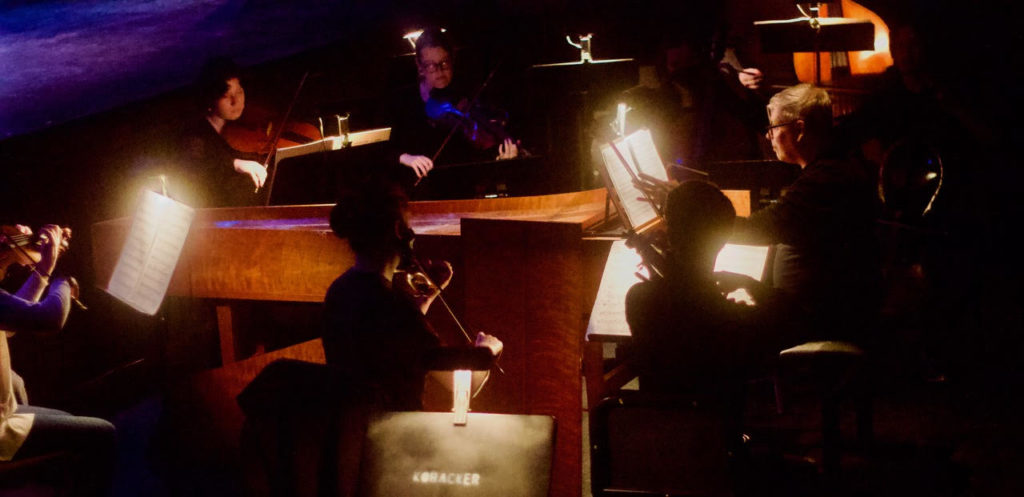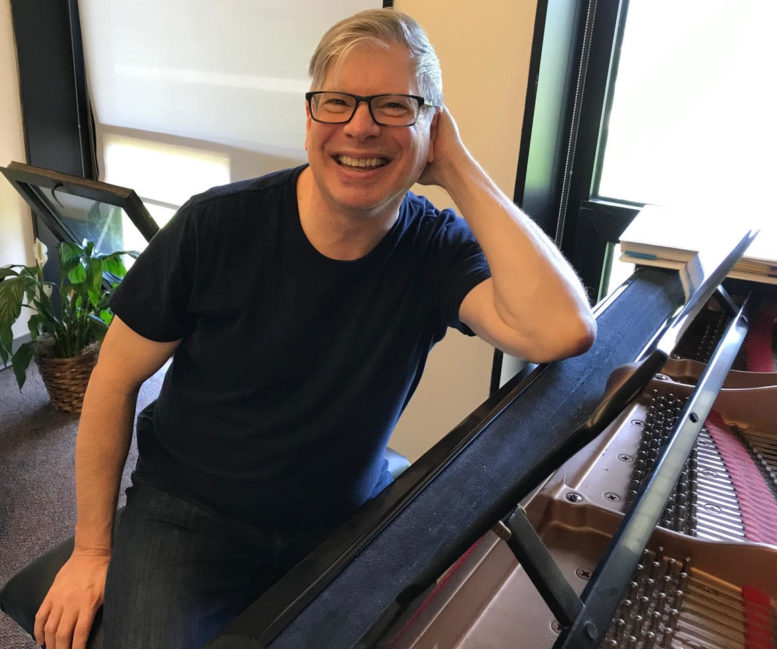By DAVID DUPONT
BG Independent News
Maybe Kevin Bylsma’s piano teacher at Calvin College was right. Maybe he was too social to make a career as a solo piano performer. That, and the teacher’s concern that he’d started playing piano too late, hasn’t stopped him from enjoying a full musical life.
Bylsma, who is on the faculty of BGSU’s College of Musical Arts and the co-artistic director of the Toledo Opera, is very pleased indeed with how his musical career has worked out.
“I have a great life,” he said recently. “Maybe a little too busy – there’s so many things happening at the same time. But it is astounding. I am one of the luckiest people I know. Not only do I get to do what I love, but I get to do all the things I love. Maybe this piano teacher was right that I’m too social a person to do just one thing.”

Following a recent interview on campus, he was going to rehearse Robert Schumann songs with a vocalist. A couple weeks ago, he was in the pit conducting the orchestra and playing harpsichord for BGSU’s production of Monteverdi’s “The Coronation of Poppea.”
And then he will head north for rehearsals of Toledo Opera’s choral showcase Celebrazione del Coro. As the Toledo Opera Chorus chorus master for the opera for 10 years, Bylsma is directing the production.
Celebrazione del Coro, a concert of great operatic choruses and arias, will be presented April 21 at 7:30 p.m., and Sunday, April 23, at 2 p.m. at the Valentine Theatre, 400 North Superior, Toledo. The concert features the 62-member Toledo Opera Chorus, Toledo Opera Children’s Chorus with soloists accompanied by Toledo Symphony Orchestra, all conducted by Bylsma. Click for tickets.
[RELATED: Toledo Opera celebrates its chorus & spotlights soloists in season finale]
The concert will present some of the greatest hits of the opera chorus repertoire.
Many, Bylsma said, were selected from operas that Toledo Opera would not be able to present because it’s a small company performing on a small stage in a small theater. “‘Turandot’ and ‘Aida’ would be difficult for us to do,” he said.
The choral celebration, they will be able to present excerpts from both.
Guest artist Lindsey Anderson will sing the aria “Chi mai fra gl’inni e i plausi” with the women of the chorus followed by the full chorus performing the “Triumphal March” from the Verdi masterpiece.
Resident artist Brendan Boyle will perform one of the best-known arias “Nessun dorma” from Puccini’s ‘Turandot’ followed by “Signore, ascolta and Non piangere Liù” performed by Christine Lyons, Alex Richardson, Corey Crider, Nicholas Kottman, Seth Johnson, Tyler Burg, and the Toledo Opera Chorus from the same opera.
Bylsma added that any Wagner opera would be a stretch, “but we can do two choruses.”
The second half of the concert will open with the orchestra performing the Prelude to Act III of Wagner’s “Lohengrin” followed by the “Bridal Chorus” from the opera and then the “Processional March and Chorus of Knights and Ladies” from “Tannhäuser.”
Bylsma is also excited to do the “Chorus of the Peasant Girls” from Tchaikovsky’s “Eugene Onegin” with women of the chorus. It’s their first-time singing Russian. They’ve taken to it “really quickly,” Bylsma said.
The concert will open with one of his personal favorites.
The first piece performed by the chorus will be “Gli arredi festivi,” from Verdi’s “Nabucco.” Before that Bylsma will conduct the 46-piece orchestra in the overture to that opera.
That was his first exposure to opera. A native of Grand Rapids, Michigan, he recalls in fifth grade attending a school performance of the Grand Rapids Symphony. The orchestra played the “Nabucco” overture. His response was: “What is this? This is incredible.” And, he added, “now I get to conduct it.”
He grew up in a family of amateur musicians. His grandmother started to take him to symphony concerts when he was about 7. Then when he was a teenager she introduced him to opera. He needed some musical understanding first, she told him. She got him the records of “La traviata” by Verdi, which he listened to before attending the opera. He was entranced. There was a boat on stage, after all. “I was hooked.”
It was at his insistence that he started playing piano at 10. Bylsma said his brother, who recently died, was 16 years older than he, and his sister was 12 years older. Both took piano lessons “to disastrous results.” So, his parents had decided “we’re not going to force them to the way we did them.”
But when he continued to express a desire to play, they relented, and he loved it. He had a teacher, he said, who prepared him well for his dream of being a professional pianist. When he enrolled in nearby Calvin College, his teacher there was not as encouraging. Bylsma had started too late and was too social. He would not make it as a solo pianist. Go into music education.
Then one day walking down the hall Bylsma spied a poster. “Pianist needed for voice lessons. Earn money” with lots of dollar signs afterward.
Bylsma decided to try.
The voice teacher was Trena Haan, who had been his mother’s choir teacher. She heard something in his playing. Bylsma recalled her telling him: “You may not be a solo player, but you have a knack, you have an ear, and I want you to work with me.”
She spent as much or more time with him as she did with her voice students. Bylsma ended up graduating with a degree in piano focused chamber music and vocal repertoire, organ, and composition – he hasn’t composed since.
Then he headed east to the University of Michigan to do graduate work in organ.
He also took a part-time position at Adrian College accompanying the choirs. While he was there, the college started an opera company, Lenawee Opera. “They needed pianist for rehearsals and needed chorus master,” he said. He had no opera experience. “They hired me for some ridiculously small amount.”
The first production was “Carmen.” He was immediately taken. “This is the greatest thing.”
This also marked his first exposure to BGSU. Some of the performers were students of Andreas Poulimenos, then teaching at the College of Musical Arts.
The soprano who sang the title role was a company member at the Michigan Opera Theatre (as of 2022, Detroit Opera) and she told him he should apply there, since they always needed pianists. He was hired as the “third rung” pianist.
Most of what he did was community outreach, including taking the show on the road to the Upper Peninsula.
After a few years, and having paid off his student loans, he decided he maybe needed to finish his master’s degree, so he left the Michigan Opera Theatre.
No sooner had he left, then he received a call from James Meena, general director and conductor at the Toledo Opera. “You should come down and see what we do in Toledo,” he told Bylsma. “From what I’ve heard about you, this might be a really good fit.”
“All my jobs come from word of mouth,” Bylsma said.
After they talked in person, and Bylsma submitted a tape representing arrange of his talents, including playing harpsichord, he was hired as the head of music preparation and the conductor’s musical assistant. “Meena taught me all my basic skills,” Bylsma said. “You can’t go to school for that. It’s like an apprenticeship. It changed everything about how I work.”
He stayed through the early years of a new management at the opera. He left in 2003, worked for a time at the University of Michigan.
In 2004, he began working in an adjunct position at BGSU. In 2006 the college established a coaching position. He now serves as a vocal coach and the coordinator of opera at BGSU.
As vocal coach, “I work on language skills and interpretive skills, and help students choose repertoire for recitals.” In general,“they go to their voice teachers to learn how to sing and to me to learn how to perform. But they get some of each in both places.” It requires several sets of ears to develop young singers, he said.
Bylsma enrolled in the new one-year online graduate program in teaching artistry and earned his master’s degree in music education.
In 2011, he got a call from Suzanne Rorick who had become the executive director of the Toledo Opera. According to Bylsma she said: “I was told I have to call you and have you come back.”
“It was like coming home,” Bylsma said.
He helps foster the link between the opera and the College of Music that gives students “an opportunity to be on stage with great artists.”
Bylsma loves all aspects of his career, including occasionally playing solo piano. But “one of my all-time favorite things is to play opera rehearsals,” he said. Not necessarily seeing the show being performed, he said, but being part of the rehearsal process. “I just adore it. … And the drama. Opera singers know how to tell stories. I’m always captivated.”

